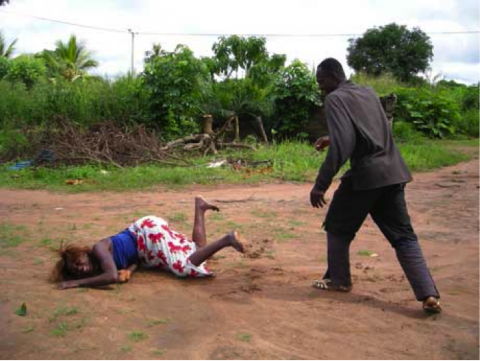
By NASSALI SANDRA
According to UN Women, safety from physical attack, harassment or other forms of aggression or abuse is central to a person's sense of well-being and is closely associated with fundamental notions of human rights. Physical injury and psychological trauma from attempted, threatened or actual incidents of violence can have major consequences for the lives of victims and can generate a substantial burden on families and the broader community in providing support for victims. It is for these reasons that an understanding of the nature and extent of violence and of means for minimizing violent behaviors are issues of major public concern.
Violence in society takes many forms. Men, women and children can all be victims, as well as perpetrators of violence. In recent years however, violence against women (abbreviated VAW) has been a particular concern of governments, community groups and women themselves. VAW is popularly defined as violent acts that are primarily or exclusively committed against women.
Sometimes considered a hate crime, this type of violence targets a specific group with the victim's gender as a primary motive. This type of violence is also gender-based, meaning that the acts of violence are committed against women expressly because they are women, or as a result of patriarchal gender constructs. The UN Declaration on the Elimination of Violence Against Women states that:
"violence against women is a manifestation of historically unequal power relations between men and women" and that;
"violence against women is one of the crucial social mechanisms by which women are forced into a subordinate position compared with men."
This has many manifestations, including forms that may be more common in specific settings, countries and regions. It manifests itself as physical, sexual, emotional and economic. The most universally common forms include domestic and intimate partner violence, sexual violence (including rape), sexual harassment, and emotional/psychological violence. Sexual violence as a tactic of warfare and in the aftermath of emergencies is also common in the respective countries and areas affected. Other widespread forms around the globe include: sexual exploitation, sexual trafficking, and harmful practices, such as female genital mutilation/cutting (FGM/C), forced and child marriage.
In Uganda, we are at a point where we can celebrate that more women and girls are being empowered socially, politically and economically as they learn to read and write and, often for the first time, since the state and families are investing in girls' education. It is also good that women are living longer and healthier lives and that more of them are surviving childbirth as the country gains greater access to health care and reproductive services. We also see throughout Uganda that women are discovering a new level of economic independence. They are contributing more to their families and communities and they are gaining access to credit and jobs that can give them a decent standing of living.This is largely attributed to the Government's efforts to combat this injustice through the passing of a legal framework that protects and advances women and girls' rights; such as the 1995 Ugandan Constitution (specifically Articles 21, 32 and 33), the Prohibition of Female Genital Mutilation Act, and the 2010 Domestic Violence Act. The country has also ratified different regional and international conventions such as the Convention on the Elimination of all forms of Discrimination Against Women (CEDAW), the International Criminal Court Act (2010), which criminalizes the sexual exploitation of women during conflict situation, UN Security Council Resolution 1820, and the Goma Declaration which is against sexual violence and ending impunity against women. Subsequent collaborations with civil society organizations to push forward this agenda in the surrounding communities cannot also go unnoticed.
However, despite such interventions, VAW has continued to plague the nation in its varied forms. It can be seen in the form of violence occurring within the family setting , such as domestic violence, marital rape, harmful traditional practices, and killings, as well as in the community, such as sexual harassment and violence in the workplace, or in trans-border contexts, such as in the case of trafficking of women and girls.
When we wake up every day and listen to the radio, read a newspaper or watch the television, we are confronted with the saddening news: domestic violence, rape, defilement, maternal deaths, murders and gender discrimination among others. And as women suffer these violations, they also have to cope with discriminatory laws and deeply entrenched gender inequality. It’s no wonder they live traumatic lives.
"Such women suffer a range of health problems and their ability to participate in public life is diminished. It also impoverishes women, their families, communities and nations," shares Regina Bafaki, the Executive Director of Action for Development (ACFODE), a national nongovernmental and women focused organization in Uganda.
Coupled with the above are the alarming statistics such as a reported rise in defilement cases by 2% in 2010 from 7564 to 7690 (Police Crime Report 2011) and the fact that 59.6% of women have ever experienced physical violence since the age of 15 (Ministry of Gender, Labor, and Social Development, 2008). The 2011 Ugandan Demographic and Health survey also shows that 39% of women in Uganda have ever experienced VAW, compared to 11% of the men. This violence is higher among women in the rural areas than those in urban areas (61% compared to 54%). In Pallisa district for instance, defilement at 80% is ranked as the highest form of sexualized violence against women, followed by rape which is at 60% (ACFODE 2009). These two inequities are also on the rise, according to the Police Crime Report (2010) with Mukono, Lira, Amuria, and Isingiro districts having the highest number of cases.
When such women seek for justice, there is lack of social support mechanisms because of the strong cultural, family and psychological pressures. Even then, most of the places where these survivors go for legal help are not trained in handling VAW related cases. Some are corrupt such as the police and Local Councils who are alleged to take bribes in cases of VAW, and are part of the culture that perpetuates violence against women (ACFODE 2011). This calls for a higher level of assertiveness in controlling and deterring the spread of this social pandemic.
As a country therefore, we need to acknowledge that we still have a long way to go to achieve full emancipation of women and girls from the hardships they experience because of their gender and social class. In light of this, there is urgent need for all citizens of Uganda to challenge militarism and end violence against women in order for peace to be upheld in every sector of the nation. Some of the strategies that can be employed to overcome this prevailing challenge include:
- Addressing the major obstacles preventing the effective implementation of commitments made in existing legislative measures that protect the lives of people especially the vulnerable like women and girls; for instance The Domestic Violence Act 3 (2010), Penal Code amendments prohibiting defilement of girls and boys (2007), and the Equal Opportunities Commission Act (2007).
- Fulfilling international commitments government has made by ratifying different regional and international conventions such as the Convention on the Elimination of all forms of Discrimination Against Women (CEDAW), the International Criminal Court Act (2010), which criminalizes the sexual exploitation of women during conflict situation, UN Security Council Resolution 1820, and the Goma Declaration which is against sexual violence and ending impunity against women.
- Institutionalizing early warning and response to VAW, in collaboration with the security community policing in the prevention service sector.
- Adopting a comprehensive VAW performance framework (in the form of an Index or Barometer) with clear standards and targets, with opportunity for civil society to present shadow or parallel reports
- Establishing national Reparation Funds for survivors of VAW
- Parliament, in its mandate, needs to pass all pending bills that aim at addressing violence against women, and discrimination against women and girls such as the Sexual Offences Bill and the Marriage and Divorce Bill.
- The need for government, through the Ministry of Gender, Labor and Social Development to declaring Zero Tolerance Now on VAW crimes and impunity, and;
- Ministry of Finance to allocate specific and adequate funding for VAW prevention programs, including the setting up of safe shelters for VAW survivors within a Gender Responsive Budgeting Framework.
The author is an MA student at the Department of Journalism and Communication
- Log in to post comments




